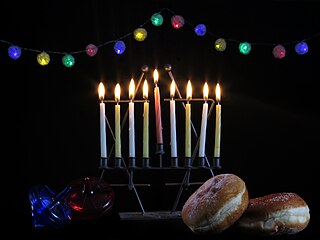
Hanukkah is a Jewish festival commemorating the recovery of Jerusalem and subsequent rededication of the Second Temple at the beginning of the Maccabean Revolt against the Seleucid Empire in the 2nd century BCE. It commemorates the reestablishment of an independent Jewish state in the historical land of Israel.

Halloween or Hallowe'en is a celebration observed in many countries on 31 October, the eve of the Western Christian feast of All Hallows' Day. It is at the beginning of the observance of Allhallowtide, the time in the liturgical year dedicated to remembering the dead, including saints (hallows), martyrs, and all the faithful departed. In popular culture, the day has become a celebration of horror, being associated with the macabre and supernatural.

The Yule log, Yule clog, or Christmas block is a specially selected log burnt on a hearth as a winter tradition in regions of Europe, and subsequently North America. The origin of the folk custom is unclear. Like other traditions associated with Yule, the custom may ultimately derive from Proto-Indo-European religion as similar traditions have been recorded in Celtic, Germanic, Baltic and Slavic paganism, among others.
The Olympic flame is a symbol used in the Olympic movement. It is also a symbol of continuity between ancient and modern games. The Olympic flame is lit at Olympia, Greece, several months before the Olympic Games. This ceremony starts the Olympic torch relay, which formally ends with the lighting of the Olympic cauldron during the opening ceremony of the Olympic Games. The flame then continues to burn in the cauldron for the duration of the Games, until it is extinguished during the Olympic closing ceremony.
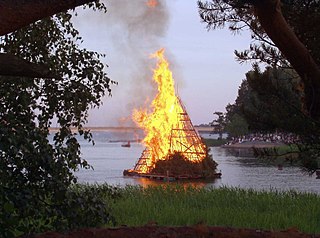
A bonfire is a large and controlled outdoor fire, used either for informal disposal of burnable waste material or as part of a celebration.

Christmas Eve is the evening or entire day before Christmas Day, the festival commemorating the birth of Jesus. Christmas Day is observed around the world, and Christmas Eve is widely observed as a full or partial holiday in anticipation of Christmas Day. Together, both days are considered one of the most culturally significant celebrations in Christendom and Western society.

A wreath is an assortment of flowers, leaves, fruits, twigs, or various materials that is constructed to form a ring shape.

The Advent wreath, or Advent crown, is a Christian tradition that symbolizes the passage of the four weeks of Advent in the liturgical calendar of the Western church. It is traditionally a Lutheran practice, although it has spread to many other Christian denominations.

Saint John's Eve, starting at sunset on 23 June, is the eve of the feast day of Saint John the Baptist. This is one of the very few feast days marking a saint's birth, rather than their death. The Gospel of Luke states that John was born six months before Jesus; therefore, the feast of John the Baptist was fixed on 24 June, six months before Christmas. In the Roman calendar, 24 June was the date of the summer solstice, and Saint John's Eve is closely associated with Midsummer festivities in Europe. Traditions are similar to those of May Day and include bonfires, feasting, processions, church services, and gathering wild plants.

Havdalah is a Jewish religious ceremony that marks the symbolic end of Shabbat and ushers in the new week. The ritual involves lighting a special candle with several wicks, blessing a cup of wine, and smelling sweet spices. Shabbat ends on Saturday night after the appearance of three stars in the sky. Havdalah may be performed as late as sunset of the Tuesday following Shabbat.
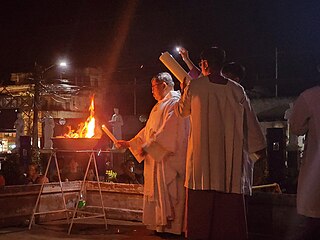
The Easter Vigil, also called the Paschal Vigil, the Great Vigil of Easter, or Holy Saturday in the Easter Vigil on the Holy Night of Easter is a liturgy held in traditional Christian churches as the first official celebration of the Resurrection of Jesus. Historically, it is during this liturgy that people are baptized and that adult catechumens are received into full communion with the Church. It is held in the hours of darkness between sunset on Holy Saturday and sunrise on Easter Day – most commonly in the evening of Holy Saturday or midnight – and is the first celebration of Easter, days traditionally being considered to begin at sunset.

The Holy Fire is a ceremony that occurs every year at the Church of the Holy Sepulchre in Jerusalem on Great Saturday, the day before Orthodox Easter. During the ceremony, a prayer is performed after which a fire is lit inside the aediculae where the Tomb of Jesus is located. According to the belief, the fire emerges miraculously and is lit by the Holy Spirit.

The ceremonial use of lights occurs in liturgies of various Christian Churches, as well as in Jewish, Zoroastrian, and Hindu rites and customs.

Christmas in Ireland is the annual festival which marks the Christian celebration of the birth of Jesus and its related observances, but also incorporates some pre-Christian customs. These customs range from the traditional food and drink consumed, decorations and rituals, as well as more modern phenomena such as the Christmas day swim and annual television and radio events. The modern Irish Christmas has become more similar to that of the British and American festive period, with emphasis on gift buying and parties.

Lumen Christi is a versicle sung in Catholic, Lutheran and some Anglican churches as part of the Easter Vigil. In Lutheran and Anglican services, it is sung in the local language. It is chanted by the deacon on Holy Saturday as he lights the candle. In the English Sarum Rite, one candle is lit.
Gŵyl Fair y Canhwyllau is a Welsh name of Candlemas, celebrated on 2 February. It was derived from the pre-Reformation ceremony of blessing the candles and distributing them to be carried in a procession. However, just as this Christian ceremony drew on pagan festivals connected with the coming of the Spring, some of the old practices that carried on in parts of Wales until the 20th century suggest older rituals.

Shabbat candles are candles lit on Friday evening before sunset to usher in the Jewish Sabbath. Lighting Shabbat candles is a rabbinically mandated law. Candle-lighting is traditionally done by the woman of the household, but every Jew is obligated to either light or ensure that candles are lit on their behalf.
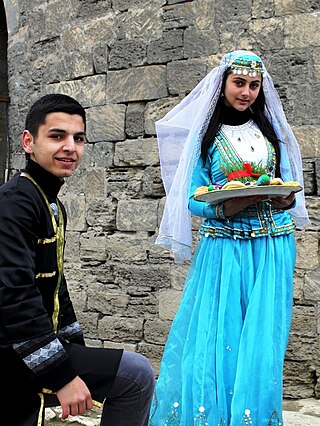
Novruz in Azerbaijan is a traditional holiday which celebrates the astronomical spring equinox and the coming of Spring. When Azerbaijan was part of the Soviet Union, the celebration of Novruz was generally unofficial and at times even prohibited. Currently in Azerbaijan, Novruz is treated as an official public holiday. In accordance with Article 105 of the Labour Code of Azerbaijan passed in 2006, workers receive five days off for Novruz. After neighbouring Iran, Azerbaijan hosts the longest observance and number of public days related to Novruz, with a total of five days.

A yahrzeit candle, also spelled yahrtzeit candle or called a memorial candle, is a type of candle that is lit in memory of the dead in Judaism.
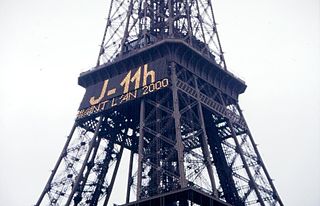
The millennium celebrations were a worldwide, coordinated series of events to celebrate and commemorate the end of 1999 and the start of the year 2000 in the Gregorian calendar. The celebrations were held as marking the end of the 2nd millennium, the 20th century, and the 200th decade, and the start of the 3rd millennium, the 21st century, and the 201st decade. Countries around the globe held official festivities in the weeks and months leading up to the date, such as those organised in the United States by the White House Millennium Council, and most major cities produced firework displays at midnight. Equally, many private venues, cultural and religious centres held events and a diverse range of memorabilia was created, including souvenir postage stamps.

















